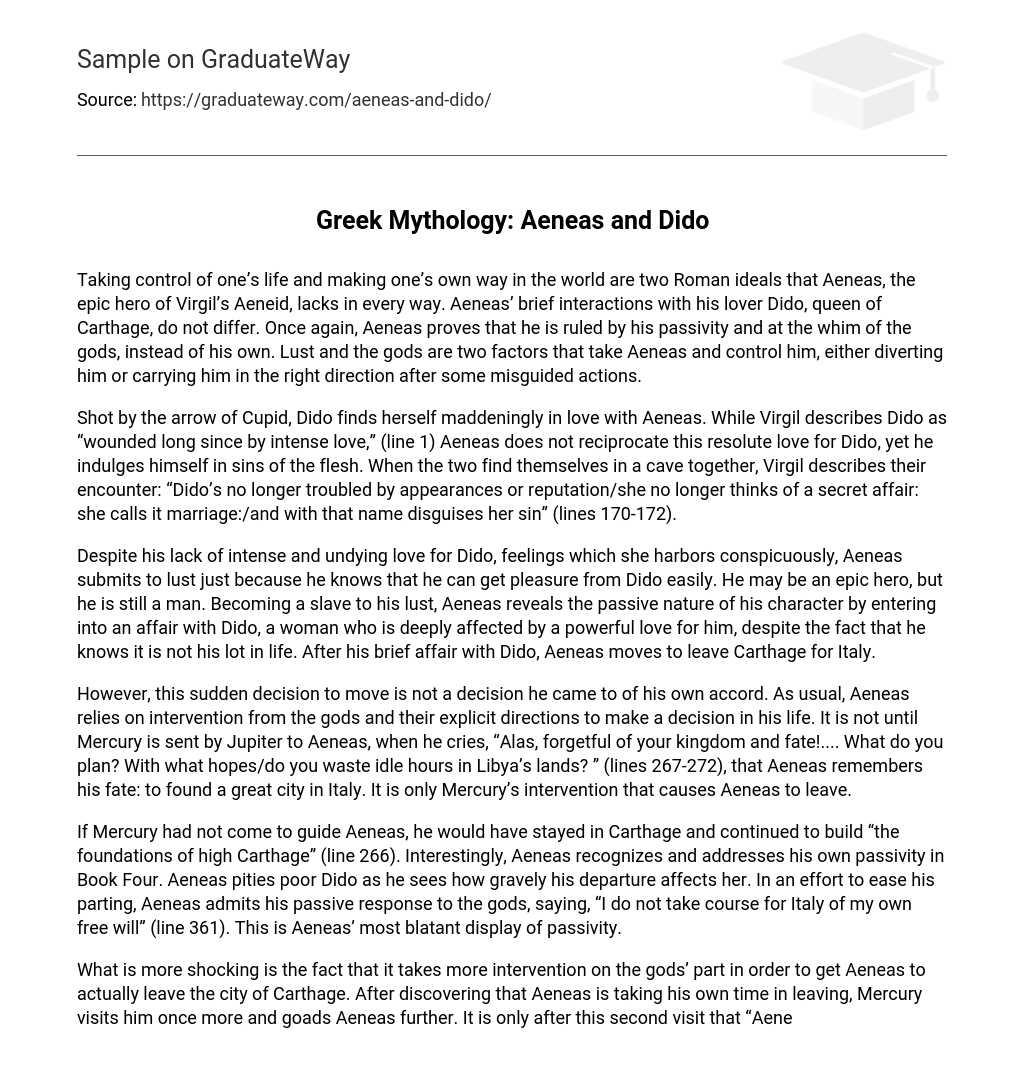Aeneas, the epic hero of Virgil’s Aeneid, lacks the Roman ideals of taking control of one’s life and making one’s own way in the world in every aspect. This is evident in his brief interactions with his lover Dido, queen of Carthage. Once again, Aeneas demonstrates that he is controlled by his passivity and is subject to the gods’ will, rather than his own. Lust and the influence of the gods are two factors that manipulate Aeneas and determine his actions, either diverting him or guiding him towards the correct path after some missteps.
Dido becomes madly in love with Aeneas after being struck by Cupid’s arrow. Virgil portrays Dido as being deeply wounded by intense love, while Aeneas does not feel the same resolute love for her and instead engages in sinful physical desires. As they find themselves in a cave, Virgil depicts their encounter, stating that Dido no longer concerns herself with how others view her or her reputation. She no longer considers their relationship as a secret affair, but rather she refers to it as marriage, using that label to conceal the sinful nature of their union.
Despite not feeling intense and undying love for Dido, which she clearly expresses, Aeneas gives in to his desires solely because he knows he can easily derive pleasure from Dido. Although he is an epic hero, he is still a mere man. Yielding to his desires, Aeneas displays the passive aspect of his character by engaging in a relationship with Dido, a woman who deeply loves him, despite knowing it is not his fate. Following their brief affair, Aeneas departs Carthage for Italy.
However, Aeneas did not make the sudden decision to move on his own. As always, he relies on the gods’ intervention and explicit directions to guide his decisions. It is only when Jupiter sends Mercury to Aeneas, and he exclaims, “Alas, forgetful of your kingdom and fate!…. What do you plan? With what hopes/do you waste idle hours in Libya’s lands? ” (lines 267-272), that Aeneas recalls his destiny: to establish a magnificent city in Italy. It is solely due to Mercury’s intervention that Aeneas departs.
If Aeneas had not been guided by Mercury, he would have remained in Carthage and continued to develop “the foundations of high Carthage” (line 266). It is interesting to note that Aeneas acknowledges and acknowledges his own passivity in Book Four. Aeneas sympathizes with poor Dido as he witnesses the profound impact of his departure on her. In an attempt to alleviate his departure, Aeneas confesses his passive response to the gods, stating, “I do not embark for Italy of my own accord” (line 361). This is Aeneas’ most blatant demonstration of passivity.
It is more surprising that additional divine intervention is required to persuade Aeneas to depart from the city of Carthage. On realizing that Aeneas is taking his own sweet time to leave, Mercury pays him a second visit and urges him further. Only after this second encounter does Aeneas awaken from his slumber, frightened by the sudden apparition, and calls out to his friends. It takes two visits from Mercury to compel Aeneas to resume his destiny. Aeneas consistently demonstrates his passive nature as a hero.
Aeneas’ submissive nature and inability to make decisions without the help of the gods is emphasized by his failure to choose the right path on his own. Twice, Mercury had to intervene and guide Aeneas in the right direction, diverting his attention from his divine responsibilities. If Aeneas were capable of making decisions independently, the gods’ tasks would be much simpler. Furthermore, his submission to lust and his fleeting emotions highlight Aeneas’ passive character. In comparison to his Greek contemporary, Odysseus, Aeneas could definitely benefit from learning a thing or two about being an epic hero. This passivity is a source of frustration for everyone involved.





